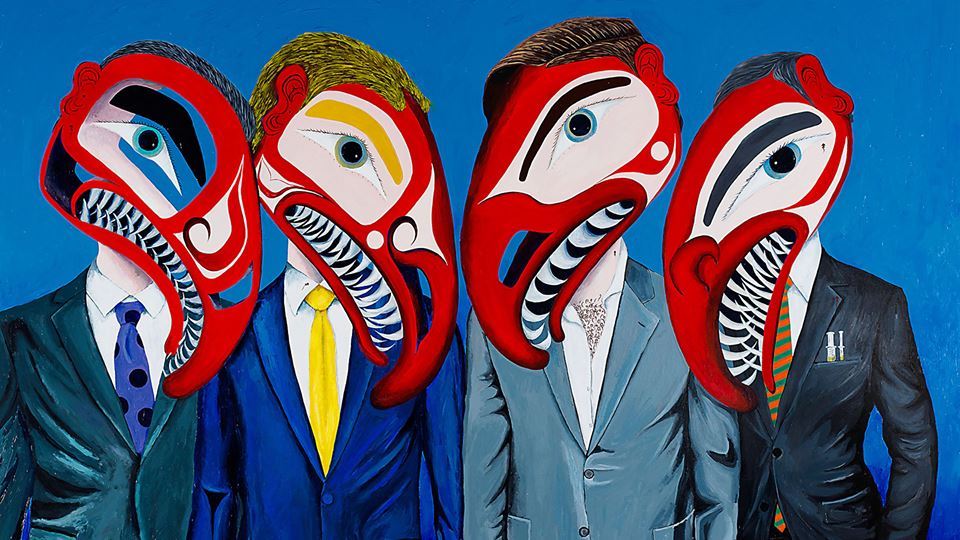Lawrence Paul Yuxweluptun: Unceded Territories

The Museum of Anthropology exhibition showcases works that span an influential 30-year career.
Visit the Museum of Anthropology for ticket information and hours of operation.
Alumnus Lawrence Paul Yuxweluptun ('83) is showcased in this
provocative exhibition of new and existing paintings, drawings,
sculptures, and installation works that confront the colonialist
suppression of First Nations peoples, and the ongoing struggle for
Aboriginal rights to lands, resources, and sovereignty.
Twenty
years since his last major Canadian solo show, Unceded Territories will
demonstrate the progression of Yuxweluptun’s artistry and ideas through
hard-hitting, polemical, but also playful artworks that span his
influential 30-year career.
A full-colour publication, Lawrence Paul Yuxweluptun: Unceded Territories, featuring essays by local and international writers and illustrated with selected works by Yuxweluptun, will accompany the exhibition and will be available for purchase at the MOA Shop.
Co-curated by Karen Duffek (MOA Curator, Contemporary Visual Arts
& Pacific Northwest) and Tania Willard (artist and independent
curator, Secwepemc Nation), Unceded Territories promises colour and
controversy through this display of over 60 of Yuxweluptun’s most
significant paintings, drawings, and works in other media – a critical
and impassioned melding of modernism, history, and Indigenous
perspectives that records what the artist feels are the major issues
facing Indigenous people today. This exhibition will undoubtedly fuel
dialogue, indignation, and even spiritual awareness as it tackles land
rights, environmental destruction, and changing ideas about what we can
expect of Indigenous art from the Northwest Coast. The issues
Yuxweluptun addresses are impossible to ignore.
Yuxweluptun, an artist of Coast Salish and Okanagan descent,
graduated from the Emily Carr College of Art and Design in BC.
Influential as both artist and activist, Yuxweluptun merges traditional
iconography with representations of the environment and the history of
colonization, resulting in his powerful, contemporary imagery; his work
is replete with masked fish farmers, super-predator oil barons,
abstracted ovoids, and unforgettable depictions of a spirit-filled, but
now toxic, natural world.
Highly respected locally, Yuxweluptun’s work has also been displayed
in numerous international group and solo exhibitions, including the
National Gallery of Canada’s special exhibition, Sakahàn: International
Indigenous Art. In 1998, Yuxweluptun was the recipient of the Vancouver
Institute for the Visual Arts (VIVA) Award. He was also honoured in
2013 with a prestigious Fellowship at the Eitelijorg Musem of American
Indians and Western Art in Indianapolis, where his art was featured in
an exhibition and book, and was acquired for the museum’s permanent
collection.